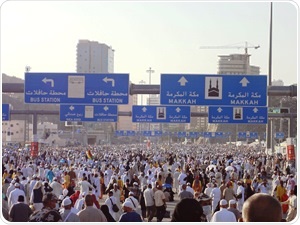Sep 22 2015
As an estimated 2 million Muslims from 184 countries gather in Saudi Arabia’s holy city of Mecca to take part in the annual hajj pilgrimage, months of preparations to care for health issues of pilgrims are also coming together.
 Over the last 6 months, the World Health Organization (WHO) and the Government of Saudi Arabia have been working together to ensure the health issues that could arise with any mass gathering of people can be addressed.
Over the last 6 months, the World Health Organization (WHO) and the Government of Saudi Arabia have been working together to ensure the health issues that could arise with any mass gathering of people can be addressed.
“With this large number of older people coming together at one time, an increase in potential health issues is always expected,” says Dr Ala Alwan, WHO’s Regional Director for the Eastern Mediterranean Region. “Whether it is working to prevent the spread of the infectious diseases, treating injuries, or providing care for chronic health issues often associated with ageing, there must be extensive coordination of health services locally during this time.”
The Ministry of Health says in addition to the permanent medical staff in Makkah province, where Mina and Mecca are located, 25 000 additional health workers have been deployed and 8 hospitals that are only used during this time of the year have been opened.
“These hospitals are complete with state-of-the-art surgical wards and intensive care units,” says H.E. Khalid Al-Falih, the Minister of Health of Saudi Arabia. “We recognize the concerns that many have regarding infectious disease in today’s environment, including the Middle East respiratory disease coronavirus (MERS-CoV), however, since the onset of the disease in 2012, there have not been any cases among hajj pilgrims, and we are working to keep it that way.”
In addition to increases in health workers and health facilities where people will be gathering, the Government requires certain health precautions from all pilgrims including immunization to protect against diseases like seasonal influenza, meningococcal meningitis, poliomyelitis, and yellow fever. In addition, health officials advise people to practise good hygiene, including:
- washing hands with soap and water or disinfectant, especially after coughing or sneezing
- using disposable tissues when coughing or sneezing and disposing of them properly
- avoiding hand contact with the eyes, nose and mouth since those can be easy ways to spread germs.
This is the sixth year that WHO has been supporting the Government in health preparations for the hajj.